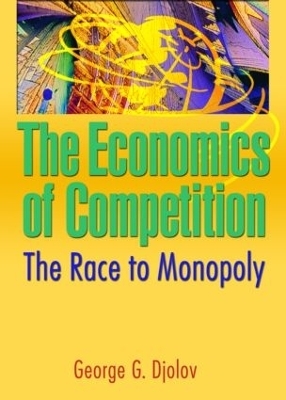
The Economics of Competition
Routledge (Verlag)
978-0-7890-2789-4 (ISBN)
- Titel z.Zt. nicht lieferbar
- Versandkostenfrei innerhalb Deutschlands
- Auch auf Rechnung
- Verfügbarkeit in der Filiale vor Ort prüfen
- Artikel merken
A comprehensive examination of the ways competition and innovations level the playing field in the free market
The Economics of Competition uses the South African pharmaceutical industry as a case study to cogently challenge accepted economic and regulatory views on competition and monopoly, then re-establishes and emphasizes the importance of foundational economic principles. The book comprehensively explores the concept that monopoly is self-limiting within unrestricted competition, as well as the various market features of competition, innovation, and market power. This detailed examination broadens understanding of the economics of competition for both scholars and practitioners.
Competition is seen as a continuous process in a free market. The Economics of Competition thoughtfully explores the competitive process in its two mechanisms, the transfer of market share from one rival to another, and innovation of a new product, new method of production, new market opening, or new source of supply of raw materials. The dynamic nature of the marketplace is thoroughly examined from the author's inside view of the South African pharmaceutical industry. This provides a rare opportunity to closely examine an industry considered to be a monopoly while actively applying economic theories of competition and freedom of choice. The effects of public policy, legislation, and pricing regulations are discussed in detail. The book has several tables and figures to enhance clarity and is extensively referenced.
The Economics of Competition discusses:
* monopoly and rivalry in the free market
* theories of perfect competition
* innovation as a controlling variable
* pricing and price differentiation
* barriers to competitionincluding historical and contemporary legislative barriers
* horizontal mergers and acquisitions as a key aspect of market power
* and more!The Economics of Competition is insightful, thought-provoking reading for policymakers as well as anyone practising antitrust law, microeconomics, industrial economics, managerial economics, marketing strategy, theoretical public health, and students and educators of marketing and economics.
George G Djolov is Associate Professor Extraordinary (quantitative methods) at the University of Stellenbosch Business School, and Head of the Socio-Economic Integration Unit at South Africa’s National Statistical Office, Statistics South Africa. Professor Djolov’s doctoral thesis has been distinguished in the top 11 at the 2013 PhD Thesis Competition of the European Doctoral Programmes Association in Management and Business Administration (EDAMBA). Professor Djolov holds a Doctorate in Business Administration from the University of Stellenbosch, as well as Master’s and Bachelors’ degrees of Commerce from the University of the Witwatersrand. Professor Djolov’s professional interests, and publications record, are in business statistics, industrial economics, and managerial economics. Professor Djolov is the past Executive Chief Economist of the federation of South Africa’s chambers of commerce and industry, CHAMSA. He was formerly the Chief Economist of the Pharmaceutical Manufacturers’ Association of South Africa, the body representing local and multinational ethical drug companies in South Africa. He is a member of the European Institute for Advanced Studies in Management. He is a past member of the European Association of Research in Industrial Economics and the Eastern Economic Association.
Foreword (W. Duncan Reekie)
Preface
Acknowledgments
Chapter 1. Introduction
Chapter 2. Competition and Monopoly Power
Chapter 3. Perfect Competition
The Social Costs of Monopoly Power
The Persistence of Cartels
The Price-Cost Margin
Chapter 4. Departures from Perfect Competition
Innovation and Competition
Erosion of Monopoly Power Under Innovation
Chapter 5. Rivalry and the Competitive Process
The Clemens-Cocks Model
Downie’s Conjecture of the Competitive Process
Chapter 6. Barriers to Competition
Economies of Scale
Product Differentiation
Absolute Cost Advantages
Redefining Barriers to Competition
Regulation and Economic Welfare
Chapter 7. Regulating the Competitive Process
Chapter 8. The Structure-Conduct-Performance Model
The Cournot Model
The Stackelberg Model
The Bertrand Model
Concentration in Practice
Chapter 9. Firm Dominance and Price Decisions
Excessive Pricing
Pricing Below Marginal Cost or Average Variable Cost
Price Discrimination
Marketing
Chapter 10. Measuring Market Concentration
Calculating Concentration Under Data Shortages
Market Definition and Concentration
Chapter 11. The Market Structure of the SA Pharmaceutical Industry
The Private Sector
The Public Sector
The Evolution of the Public and Private Sectors
The Legislature and the Industry
Parallel Importation and Single-Exit Pricing
Compulsory Licensing and Generic Substitution
Chapter 12. The Pharmaceutical Industry and Monopoly Power
Testing for Proposition 1
Testing for Proposition 2
Testing for Proposition 3
Chapter 13. The Impact of Mergers and Acquisitions
The Private Sector
The Public Sector
Chapter 14. A Microeconomic Inspection of the Industry
Sample-Size Selection
The Private Market
The Public Sector Market
Synopsis of the Microeconomic Study
Chapter 15. Conclusion
Notes
Bibliography
Index
| Erscheint lt. Verlag | 26.7.2006 |
|---|---|
| Verlagsort | New York |
| Sprache | englisch |
| Maße | 138 x 216 mm |
| Gewicht | 650 g |
| Themenwelt | Wirtschaft ► Betriebswirtschaft / Management ► Unternehmensführung / Management |
| ISBN-10 | 0-7890-2789-5 / 0789027895 |
| ISBN-13 | 978-0-7890-2789-4 / 9780789027894 |
| Zustand | Neuware |
| Haben Sie eine Frage zum Produkt? |
aus dem Bereich


